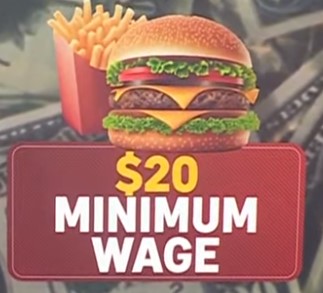Opinion By Jon Coupal – April 13, 2024
California would be a far better state if politicians and progressive activists were required to take a course in basic economic principles. If they did, they might not blindly pursue economic policies that not only damage people’s lives generally, but also fail to accomplish their intended goals.
Examples of this are numerous. In fact, here are a few from media reports just this past week.
First on the list of policy choices exposing the lack of critical thinking by those on the left is the story out of Los Angeles regarding the ULA tax.
As noted by Susan Shelley, this month is the one-year anniversary of Measure ULA, a punishing real estate transfer tax on the sale of all properties valued over $5 million. Deceptively called a “mansion tax,” proponents didn’t limit it to just mansions. Virtually all income-producing properties, including new affordable housing projects, are swept into its reach.
When Measure ULA passed – based on the well-documented deception – the proponents were giddy with anticipation for a flood of new revenue for their favorite projects. This includes an infusion of money to sustain L.A.’s Homeless Industrial Complex. According to the city’s projections, ULA would raise $600 million to $1.1 billion annually. However, the tax take has fallen way short of the projections, bringing in just $173.6 million in its first year.
Second, California’s fast-food $20 minimum wage just kicked in and, according to most rational economists, will result in reduced employment. This is especially bad timing given that California has the highest unemployment rate in the nation. While promising to lift families out of poverty, the $20 minimum wage will fall short of that goal according to economist David Neumarkat the University of California, Irvine. And to add insult to injury, the price increases on fast food will hit low-income families the hardest.
When it comes to minimum wage laws, progressives forget that the real minimum wage is zero. If your employer lays you off to reduce overall costs associated with the new law, your paycheck disappears.
Why do progressive politicians think that businesses and taxpayers won’t change their behavior in response to higher taxes or heavy regulations? One would think that repeatedly seeing pie-in-the-sky revenue projections from big tax hikes that fall way short of reality would be a wakeup call.
In trying to project the impact of any government policy that restricts market forces, the failure to account for predictable changes in behavior is called “static scoring.” Static scoring is different from “dynamic scoring.” Dynamic scoring simply means taking into account predictable changes in behavior that result from tax increases or business mandates to accurately project the amount of money that will be raised.
Applying this to the two examples above, if the ULA tax was not 4% but 100%, how much money would that raise? Not much. There is no reason to sell a property if there will be no financial benefit from the sale. And if a $20 minimum wage is good for workers, why not $100 per hour? Obviously because raising the minimum wage to $100 per hour does not create the revenue to pay a wage of $100 per hour, and that will mean the end of the job, if not the entire enterprise.
Conservative economists, including the late Milton Friedman, have always stated that if you want more of something, tax it less, and if you want less of something, tax it more. It is doubtful that any government entity sets out to reduce economic growth, but that is precisely what they get if they increase taxes on those who generate economic growth.
Jon Coupal is president of the Howard Jarvis Taxpayers Association.
Editor’s Note: Two states have the lowest minimum wage rate in the US: Georgia and Wyoming at $5.15/hr.



Recently on way to Eureka I stopped at Burger King in McKinleyville. I ordered what appeared to be a special for 2 small cheeseburgers small fry, and small drink. He rang it up and I forget exact amount but it was around $18. I said that’s “too much.” Shocked, I turned around and left. I thought I could probably go to a restaurant for that price. My favorite is $7 Cheeseburger meal at Dairy Queen in Brookings: cheeseburger, fries, drink, and a sundae (used to be $5).